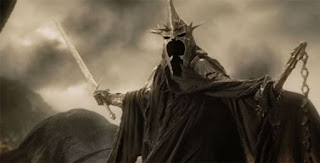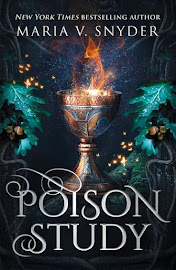.
Tis a truth universally acknowledged that an aspiring hero in possession of an excellent quest-adventure must be in want of an antagonist.
And not just any antagonist, but a rip-roaring, no-holds-barred bad guy -- so welcome, gentle readers, to the Year of the Villain in our own, much loved, Fantasy fiction.
 |
Sauron in "The Lord of the Rings" films
|
We have it on good authority that the place to start is "the very beginning", and although that really isn't
The Lord of the Rings for either villains or fantasy, I do feel that JRR Tolkien's classic is foundational in terms of the genre.
It's also, just imho, a very interesting work when we turn the spotlight, and the microscope onto a little scum and villainy, aka antagonists and archvillains, nemeses and "big bads."
Starting with Sauron, who is what I think of as "monolithic evil", meaning that he is unremittingly and irredeemably bad, but also immense. Yep, Sauron is evil on an all-out, world (if not universe) sized scale, that seems impossible to defeat.
 |
Sauron in "The Rings of Power" series
|
Here's the thing, though, Sauron is also remote -- I suspect because it would be hard, if not impossible, to main that sense of monolithic power if the story got too close to him. So he
needs to be distant to work, but that means the narrative also has to bring his evil into the story in a more immediate way, and also offer lesser contests (between hero and villain) that the reader can engage with more directly.
The first objective is achieved by means of the ring itself, which contains a significant part of Sauron's power, i.e. "one ring to rule them all." It's also as seductive as it is dangerous, ultimately consuming the mind and will of the bearer.
 |
"One ring to rule them all..."
|
The only way to counter the ring is not to wear it, but even then its will -- and through the ring, Sauron's evil -- works on the ringbearer. Over two thousand years before Frodo inherits the ring, it has betrayed the hero, Isildur, to his death.
So throughout the time he bears the ring, Frodo is constantly tempted to wear and use it, and the closer he comes to Mt Doom, and to Sauron, the more the ring becomes a weight on mind and spirit. One he very nearly doesn't survive.
 |
Frodo & the One Ring
|
.Yet the ring is still an object, however powerful, and its evil is impersonal as well as focused on the bearer. So in terms of less monolithic but still potent antagonists that the heroes can fight, enter the Lord of the Nazgul, aka the Witch-King of Angmar, and Saruman, a wizard sent to oppose Sauron (along with Gandalf) who ends falling beneath his sway.
The Lord of the Nazgul plays a significant part in the first and third books in the trilogy. In The Fellowship of the Ring, he leads the Nazgul's (the nine Black Riders') terrifying pursuit of the hobbits, which is only stopped, after many close calls and narrow escapes, by the power of Rivendell.
 |
Lord of the Nazgul
|
.Much later, in
The Return of the King, he commands the equally frightening assault on Minas Tirith, which only fails by the narrowest of margins, in large part because he meets his own long-prophesied end --
"not by the hand of man" but by the sword of Eowyn, a woman, and the dagger of Merry, a hobbit.
Any of you who have read the books or watched the film will know Eowyn and Merry's desperate, against-the-odds fight is heart-stirring stuff -- and one we can engage in deeply, which (of course) is why the story grips us.
 |
Saruman the White
|
.Saruman fulfills a very similar roll in the trilogy's second book,
The Two Towers. At first he, too, is a distant figure, one that has unleashed rampaging armies of super-orcs (the fighting Uruk-hai) on Sauron's behalf. A series of alarms, pursuits, and battles follows, but at the end Saruman is defeated and held to account. The Witch King, and ultimately Sauron and the ring, are destroyed but with Saruman, the reader sees the consequences of a villain's defeat and fall.
I mentioned orcs, and between Uruk-hai and goblins, trolls and corrupted humans, there are plenty of evil minions in The Lord of the Rings. But when it comes to the pantheon of villains, the fifth and final place goes to Smeagol, better known as Gollum.
 |
| Uruk-hai |
.Gollum was corrupted by the ring from the outset, murdering his cousin to acquire it, and subsequently possessed by it. Having lost the ring to Bilbo (Frodo's uncle) in
The Hobbit, he is obsessed by the need to recover it, a determination that leads him to Frodo and Sam.
Gollum's villainy is the opposite of Sauron's monolithic power. He is physically small, and while vicious, is also wretched, being a victim of the ring as much as its instrument. Gollum is also the one villain where there is a real possibility, however slender, of redemption -- a narrative arc that is possible because his part is personal, flawed in a way we can comprehend, and very much an active part of the story.
 |
| Gollum |
.So there we have them: The Lord of the Rings' pantheon of villains. Together, they have established a baseline for villainy in contemporary Fantasy -- as well as a guide for how to make evil in storytelling work, so we, as readers, are right there with the heroes on their quest-adventures.
© Helen Lowe
~*~
About the AuthorHelen Lowe is an award-winning novelist, poet, and lover of story. With
four books published to date, she is currently completing the final installment in The Wall Of Night series.
Helen posts regularly on her “…on Anything, Really” blog, monthly on the
Supernatural Underground, and tweets @helenl0we





















